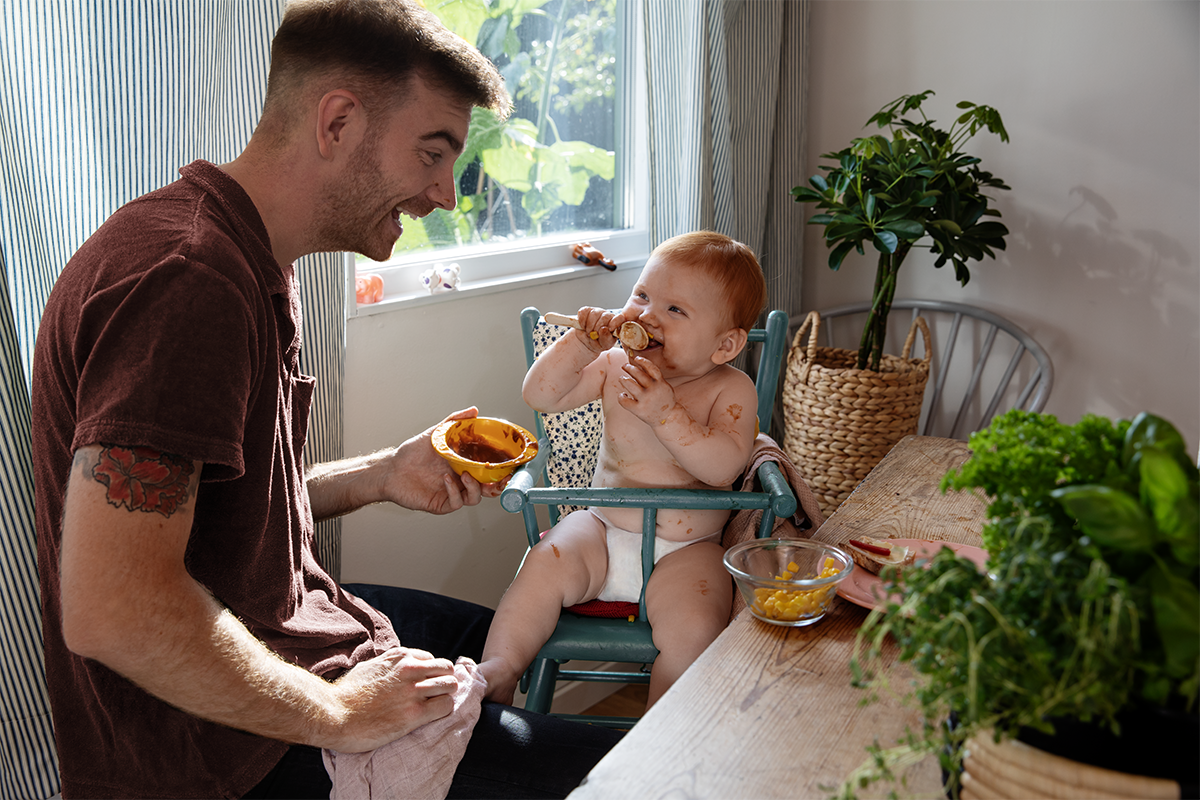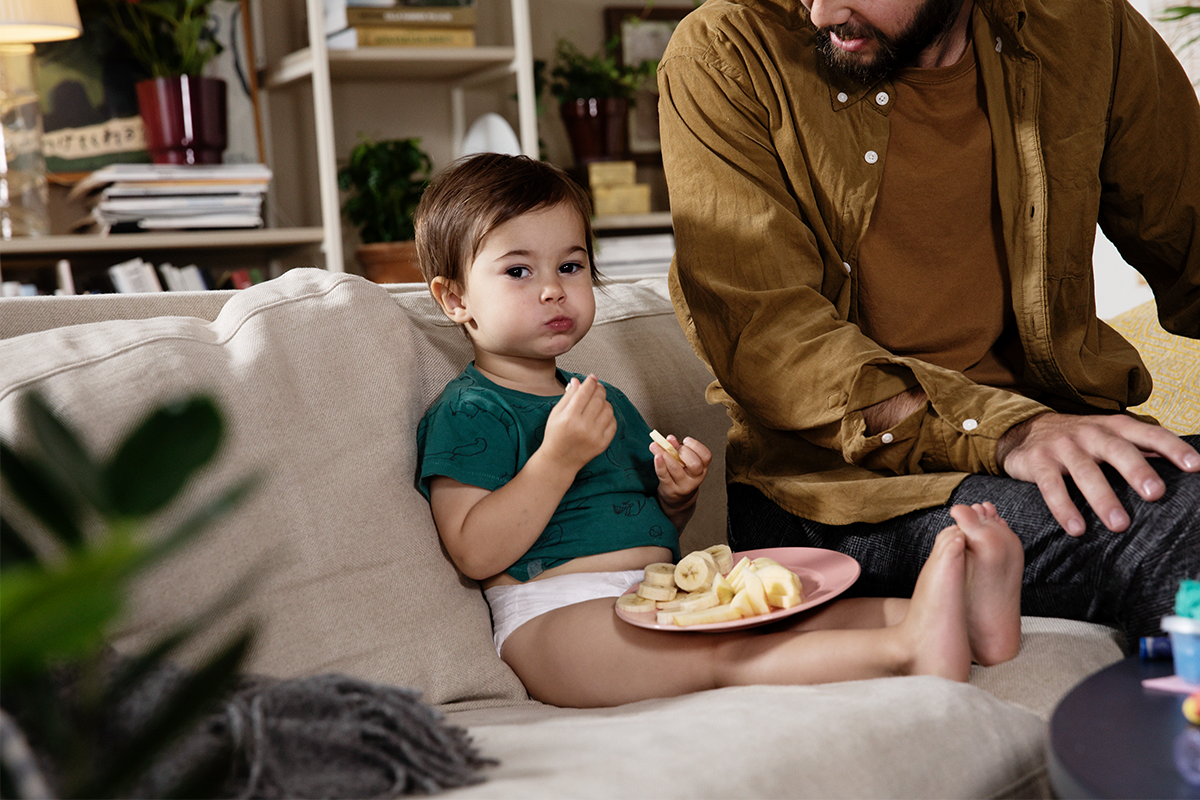Vegetarian food for babies

Perhaps you are a vegetarian yourself and want your child to eat a vegetarian diet like you, or maybe the whole family is making the change at the same time. Whatever the reason for wanting to go green, it is usually perfectly fine for young children to grow up on a vegetarian diet.
Vegetarian food often contains more vegetables and fibre and has a better balance of fats than non-vegetarian food. So if you do want to feed your child vegetarian food, you’ll have a good starting-point, since your body, your wallet and the climate tend to benefit from a significant, or even total, proportion of your food intake being plant-based.
Think about energy intake when cooking vegetarian food for children
It may seem obvious that finding the right substitute for protein when choosing plant-based foods is particularly difficult, but this is rarely a problem as protein can be found in many foods such as beans, peas, lentils, Quorn, quinoa or tofu. However, what can be a bit of a challenge when it comes to vegetarian diets for children is getting enough energy – which is needed for them to grow and gain weight. Young children have small stomachs and can’t eat large portions, and meat, eggs or oily fish are high in energy per gram, so you don’t need to eat much to get enough energy.
Depending on how many foods you exclude, you will also need to ensure that your child gets essential nutrients from other substitute or fortified foods. If you want to feed your child a vegan diet, you need to be extra knowledgeable about nutrition, and provide additional supplements of fortified products and certain vitamins, such as vitamin B-12.
As with food in general, care should also be taken to provide a diverse range of foods. This is not only important from a nutritional point of view, but a varied diet is also needed for children’s small tummies and intestinal flora.
Introducing little tastes and food to a vegetarian baby
How you introduce little tastes and then slightly larger portions is just the same as for babies who eat animal products. However, care should be taken from the outset to provide fortified foods with nutrients that the child may not get enough of from a plant-based diet, such as calcium and iron. As always, there are certain foods that should be avoided in the first year of life and certain foods that are good to introduce early – to reduce the risk of certain food allergies. You can read more about this in the article titled 20 great tips on babies and food.
Good vegetarian food ideas for children
Serving vegetarian food to your little one is perfectly normal, so here are some practical tips to help in the kitchen:
- Children need iron-enriched porridge because they grow so much. If you want to make your own porridge, consider using iron-rich grains such as millet, oats or buckwheat and serve it with fruit that is rich in vitamin C.
- Cook in a cast iron pot when you can, since this naturally releases some iron and makes the food a little more rich in the mineral.
- Fruits, vegetables and berries provide plenty of vitamin C and help the body absorb iron more easily, so try to make sure that all your child’s meals include them.
- Hummus, peanut butter or bean dip are great as sandwich toppings – they’re high in energy and full of nutrition.
- Legumes such as lentils, and bean and pea products contain carbohydrates but also provide the body with the protein and the essential nutrient selenium that would otherwise come from meat. For example, try adding cooked and mashed red lentils to your pancake batter or blended white beans to your waffles. Plant-based mince, such as one made from pea protein, is also a good source of protein and is great in Bolognese and tacos.
- If you don’t want to give your child dairy milk or yoghurt, buy fortified oat or soya milk to meet their calcium needs.
- Add some extra rapeseed oil, flaxseed oil, mixed walnuts or crushed chia seeds to your food for the essential omega 3 fats – this is especially important if your child doesn’t eat fish. Bear in mind that algae oil should be used with caution with children as it can prevent the blood from clotting (if they have too much of it). Other algae products may contain doses of iodine that are harmful to children and should therefore be avoided.
- Other good sources of energy for a vegetarian diet include avocados (great to use as a base for a smoothie) or nuts, which can be finely chopped and mixed with dried fruit. Nuts also contain the important nutrients selenium and zinc, which are otherwise obtained from animal products.
- Try to choose a variety of grains when buying bread, biscuits, cereals and pasta to get as many different nutrients as possible.
- If your child does not eat eggs, fish and milk (which are important sources of iodine), it is important to ensure that the salt used in your child’s diet is enriched with iodine.
Can all children eat a vegetarian diet?
Usually, yes. A vegetarian diet can be eaten at any age, however, there are some people who should not eat an exclusively vegetarian diet as it is simply not sufficient from a nutritional and energy point of view. This may include children who are not growing or gaining weight as they should, or children who have a lot of food-related allergies and therefore need to exclude a lot of other foods from their diet. In this type of case, you should always discuss the situation with your child’s doctor.
Please note that all information above is based on Swedish recommendations.

